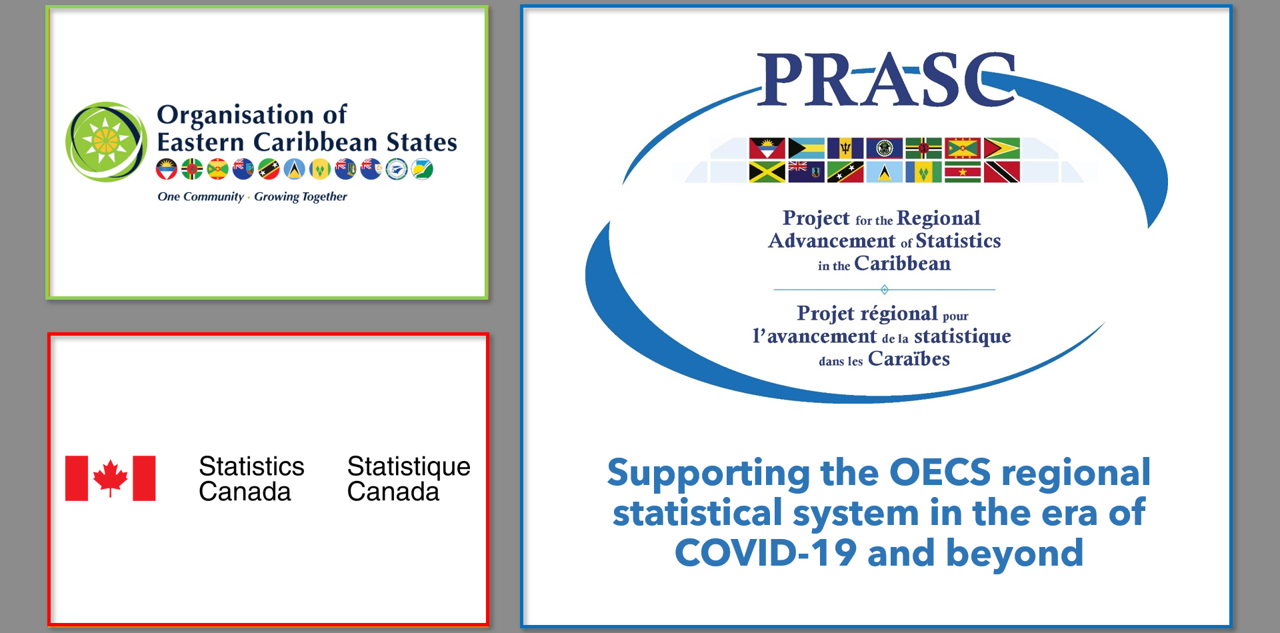OECS Commission and Statistics Canada deliver statistical training for OECS Member States
Media Release
The OECS Commission, in collaboration with Statistics Canada delivers training to agencies of the national statistical systems of each OECS Member State on the configuration, purpose and uses of a statistical business register (SBR).
An SBR is a regularly updated, structured database of legally operating businesses (economic units) in a country, maintained by the national statistics office (NSO), and used for statistical purposes. Among these uses are (a) as a sample frame for economic surveys such as the ones that produce estimates of the gross domestic product (GDP); (b) for statistics required to provide indicators of both short-term and structural economic developments; (c) to produce statistics on the anatomy of the business environment, such as number of businesses operating in a particular industry; the number of businesses that are classified as MSMEs or SMEs; or the rate of business births and deaths; and (d) to integrate with geospatial data to add a location dimension to business development.
In order to produce and disseminate country comparable data and statistics as mandated by the Revised Treaty of Basseterre, the OECS Commission will undertake to standardise the configuration of national SBRs with minimum design requirements to the extent that NSOs can produce comparable economic data and a common set of data on the topology of OECS businesses. If the coverage, comprehensiveness and quality of these SBRs vary among the OECS countries, aggregate data on the Eastern Caribbean Economic Union and the Eastern Caribbean Currency Union, and the OECS region as a whole, would be unrepresentative, and thus of poor quality.
The imperative for nationally consistent and regionally comparable statistics cannot be achieved without some form of standardisation and integration of national statistical and administrative registers (such as those maintained by social security and inland revenue). For instance, ABC Co. Ltd registered at the social security organisation and at the inland revenue department must have the same international classification for the industry in which it operates. Otherwise, GDP data will not be sufficiently representative of economic activity in a country. An OECS assessment of the use of the International Standard Industrial Classification (ISIC) revealed inconsistencies among agencies for the 4-digit codes assigned to businesses.
The SBR training forms part of the OECS Commission’s programme of immediate and targeted support to OECS NSOs to take advantage of the opportunities exposed by COVID-19, and which is described in the OECS COVID 19 and Beyond Impact Assessment and Responses. Though the NSOs’ operations were interrupted during the pandemic, the crisis revealed capacity gaps and operational inefficiencies that can be addressed with support from the Commission’s development partners for statistics in the immediate to long-term. A series of virtual workshops and webinars has been organised to support the Member States.
The SBR workshop will be used:
- To provide practical guidance on core issues of establishing and maintaining the SBR to preserve national consistency, regional comparability and international compliance;
- To clarify concepts and definitions, including for with a view to ensuring regional harmonisation;
- To illustrate how the SBR is a source for statistics and analysis of business population and its demography;
- To demonstrate how the SBR can be integrated with other administrative registers and business surveys to produce new statistics, and extract new insights on business topology and activity;
- To clarify the SBR’s role in strengthening coordination among the agencies in the national statistical system;
- To discuss an approach to ensure national consistency and to harmonise SBR in the OECS RSS;
The workshop is being facilitated by the staff of Statistics Canada as part of the Project for the Advancement of Statistics in the Caribbean (PRASC), and delivered virtually, one day a week over a six-week period from 22 July to 26 August. Participants will represent the national statistics offices (NSOs), social security organisations, inland revenue departments, registrars of business/companies in OECS Member States; the Eastern Caribbean Central Bank, and the OECS Competitive Business Unit. The Turks and Caicos Islands have been invited to participate in the workshop. The recently delivered international standard industrial classification (ISIC) training is a pre-requisite for the SBR workshop.
PRASC is seven-year technical assistance project, launched in March 2015, funded by the Government of Canada and executed by Statistics Canada. This workshop falls under the Business Survey Infrastructure Component, designed to help PRASC participating countries to improve production and dissemination of business and economic data and official statistics. OECS Member States are receiving technical assistance to design and operationalise their respective SBR. PRASC flexibility allows it to respond to new priorities makes it possible for OECS countries to receive this timely support from Statistics Canada.
This workshop contributes to the availability of and access to economic data and is aligned to the objectives of the Strategic Priority 2: Coordinate and Strengthen the National Statistical System of the OECS Regional Strategy for Development in Statistics (RSDS). Launched in 2017, the OECS RSDS is the region’s 14-year statistical development master plan for the advancement of data and official statistics.
